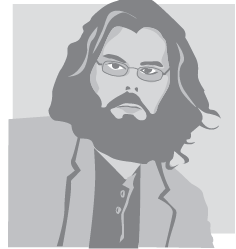aNewDomain  — I was at a conference in Malaysia. I did some workshops, presented findings from some research. The audience was mostly undergraduate students. Young, earnest, lively.
— I was at a conference in Malaysia. I did some workshops, presented findings from some research. The audience was mostly undergraduate students. Young, earnest, lively.
When it was done, the conference faculty had dinner with the student volunteers. We talked about deep stuff. Existential theory, international psychology, indigenous therapies. And when the food was gone, one of the students said I was amazing, and that this was all very extraordinary. Faculty spending time with students as equals.
I felt a burst of annoyance, and then of inspiration.
No. Not amazing. Not extraordinary. What could be more ordinary than having dinner? Drinking tea?
This was not the first time it had come up. At the end of two previous workshops, people had suggested I must be very tired. But I was not tired. In the workshops, I just said what I knew, invited people to express how they felt, gave them means of accessing feelings. What could be more ordinary than saying how you feel and listening to someone else do the same? Not work. I wasn’t tired because I had done no work.
Going to your retail job, trying to talk people into buying some bullshit they don’t really need, pretending to be happy when your heart is breaking, those things are work.
And I thought of what my friend Todd DuBose says on the subject of psychotherapy training. Students learn at the end that all they really need to do is stay with the client. Listen to what they say, try to understand it, support them. Sometimes, be your own person. The students wonder why they had to learn so much theory. Stats, personality theory, objective tests and measurements, philosophy… what was it all for if all there is to do is to be ordinary?
 I watched him do a therapy demonstration in Hong Kong and was impressed with how boring it was. There just wasn’t any drama. Nobody cried, nobody tried to make anyone else do anything. There was no illness and no cure, just two people chatting quietly, comfortable with one another.
I watched him do a therapy demonstration in Hong Kong and was impressed with how boring it was. There just wasn’t any drama. Nobody cried, nobody tried to make anyone else do anything. There was no illness and no cure, just two people chatting quietly, comfortable with one another.
The theme permeates the literature on existential psychology. Salvadore Minuchin, famed family therapist, suggests we read his books and then forget about them. Learn techniques but never practice them on people. Be yourself.
May and Schneider note the dearth of method in the writings. Van Kaam exudes caution regarding the agency of the client. Far too easy to influence, to push towards some conception of ours of what it means to be good or live well.
The same sorts of admonition permeate Zen literature. All the masters exhorted us to merely be ordinary. Meditation is not a special mental state but a way of life. There is beauty in sweeping the floors, peeling the vegetables, and such beauty matches that of all the experiences we might prefer to treasure. Banality is a part of life.
All these things flashed through my head in that Malaysia restaurant, the curry-and-noodles version of Applebees or some other banal chain place. This is all very ordinary.
The students seemed to get it. We talked over the concepts for a few more minutes. Then it was time to go. There were regrets, promises to stay in touch. A few tears among those who had bonded the most. Jokes, a song. I
hummed something on the way out, a friend wondered what it was. When I told her it was How Deep Is Your Love by the Beegees, amazingly she knew the song and an impromptu sing-along got started. Everyone knew it. Twenty people sang disco together on their way out of a shopping mall in Malaysia.
Totally banal, utterly ordinary, amusingly absurd.
And also touching, beautiful.
Amazing.
That’s at the heart of existential thought: That thought is ordinary. S
Sometimes we work so hard pretending that we are not anxious that we give the impression anxiety isn’t normal. But it is. Utterly ordinary.
Maybe that’s a story for another day.













